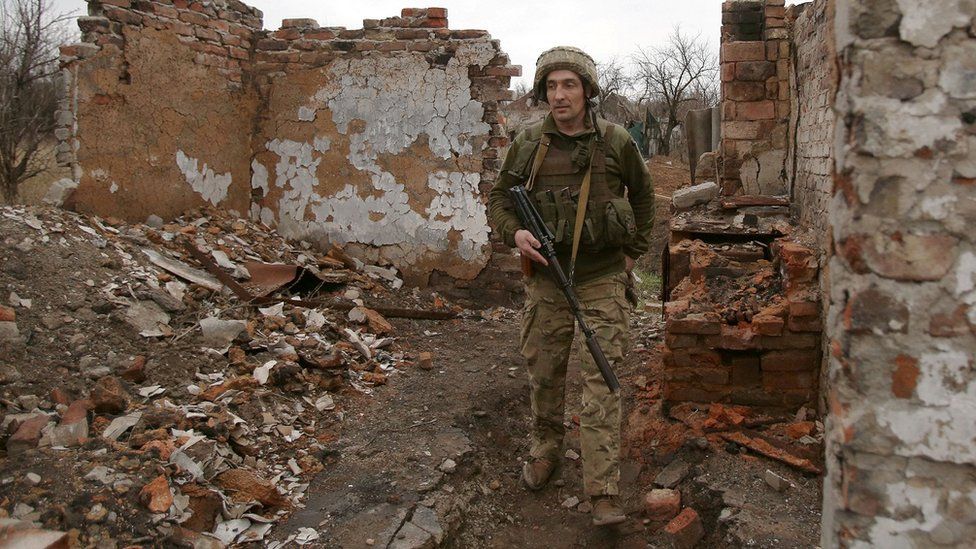How will Russia-Ukraine tensions impact the global financial market?
There are widespread concerns about Russian military troop movements on the border with Ukraine. How will these tensions impact global financial markets?

Areas of eastern Ukraine have been devastated by ongoing conflict with Russia-backed separatists. Photo: Reuters
It happened to Joe Biden this week on a video call with his Russian counterpart Vladimir Putin. Could that be an omen as investors will be wondering in the New Year whether the US administration will go on mute, should Russia mobilize its large troop numbers on the border with Ukraine to invade the country.
It’s undoubtedly difficult to say whether the mass troop build-up is a sign of imminent attack. But it seems that the markets could be on high alert early next year. Indeed, it could be one of the first crisis situations that financial markets have to face in 2022. But rather than dwell on the likelihood of military action by Russia – and retaliation from the US and others – Mr. Steve Barrow, Head of Standard Bank G10 Strategy thought he would just cover the bases on how any significant build-up in tensions and, worse still, military action could impact the markets.
This might seem a hard job but there is a fairly recent template, of course, in the shape of Russia’s early-2014 annexing of Crimea. Back then, the build-up of tensions early in the year exploded into a rise in risk aversion across certain assets as Russia’s operation got underway. The VIX index of stock market volatility, for instance, rose from around 12 or 13 before the action started to a high of around 21, and the S&P 500 lost a quick 5% of its value before recovering. Ten-year US treasury yields fell by nearly half a percentage point over the same period. Other markets were not so heavily impacted. Oil prices, for instance, reversed early-year weakness as the conflict started, but there was no surge in prices and, on the currency market, the dollar did not experience a significant safe-haven surge.
The question today is whether market reactions will be similar, should Russia decide it wants to annex the whole of Ukraine and not just a part of it. “We think there are good reasons to feel that they are not. For a start, the backdrop is different. For over the past year, or so the reliance of Europe on Russian gas, and perhaps particularly the UK, has been seen quite clearly. Gas prices have soared dramatically and this has been a significant part of the story of rising inflation in Europe. Russian encroachment on Ukraine and the probability of Western retaliation could clearly create even more volatility in gas prices that have already moved dramatically. The Nord-stream gas pipeline, for instance, that is due to start Russian gas flowing directly to Germany would seemingly be shut off from the German side should Russia move on Ukraine. If more volatility in gas prices meant another steep increase, possibly associated with a surge in other energy prices it would clearly complicate the situation for central banks that already face steep inflation from both energy and non-energy sources”, Mr. Steve Barrow said.
The ECB could be left in a difficult position as stagflation fears would likely mushroom as indeed, they would across the rest of Europe and beyond. Sharp rotations would presumably occur within stock indices but the overall market mood would undoubtedly sour considerably and if sharp price declines and deteriorating economic growth expectations could not be countered with easier monetary policy, given high inflation, the bloodbath in risky assets could make the early 2014 bout of weakness seem like a tea party.
“In this environment, we would expect the dollar to receive a much bigger safe-haven bid than it did back in 2014 and the euro, alongside Eastern European countries could be the ones in the firing line. Contagion would undoubtedly spread, though to other riskier assets. In short, an invasion and the Western response to it could mean a (military) catastrophe on top of a (Covid) crisis and so compound a very negative start to the year. Of course, it might not all come to this. Solutions might be found along more diplomatic lines – provided the mute button is not pressed, of course”, Mr. Steve Barrow stressed.








